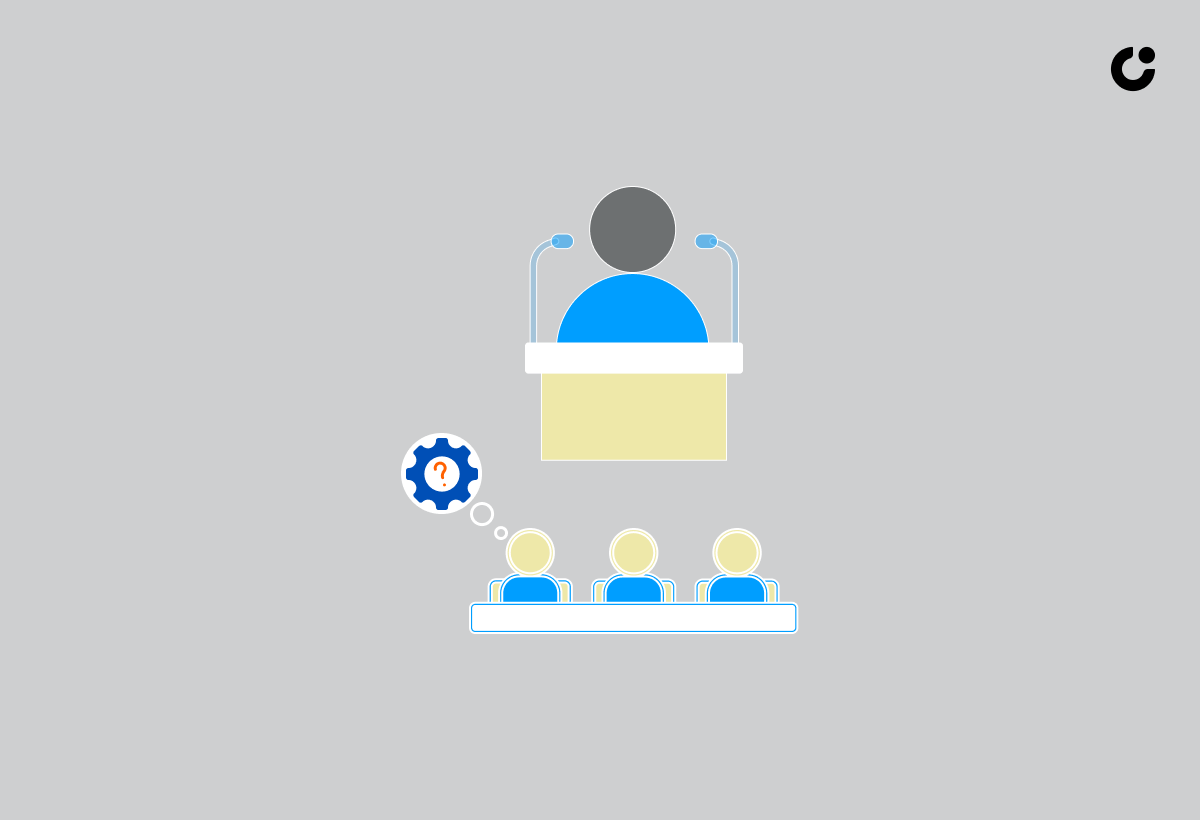Are you looking to make your next event truly engaging and impactful? In this article, we will explore the importance of asking the right questions when inviting guest speakers. From understanding their passions and challenges to preparing for maximum engagement before the event, we will provide you with a comprehensive guide.
Learn how to enhance audience interaction during the event and gather valuable feedback for continuous improvement. Let's dive in and ensure the success of your next virtual event!
Key Takeaways:
- Prepare targeted questions before the event to ensure maximum engagement with guest speakers.
- Utilize icebreaker and deep-dive questions during the event to promote audience interaction and value extraction.
- Collect feedback and evaluate speaker satisfaction to continuously improve event success and end on a positive note.
Introduction to Engaging Guest Speakers

Engaging guest speakers play a crucial role in virtual events by captivating the audience and fostering interaction and engagement.
Guest speakers bring a fresh perspective and expertise that can elevate the overall experience for participants.
Their insights can spark thought-provoking discussions and inspire attendees to actively participate.
Through their engaging presentations, they not only inform but also entertain, keeping the virtual event dynamic and interesting.
Guest speakers often attract a larger audience, drawing in individuals who are eager to learn from industry leaders and experts.
The Importance of Asking the Right Questions

Asking the right questions is paramount in ensuring a successful and insightful interview with a guest speaker.
Crafting thoughtful and relevant questions sets the tone for the entire interview process. These questions not only guide the conversation but also demonstrate to the guest speaker that you have done your homework and are genuinely interested in their perspectives. By researching the background of the guest and tailoring questions to their expertise, you create a platform for them to share valuable insights. Well-crafted questions can delve deep into the subject matter, leading to engaging and informative dialogues that captivate both the audience and the interviewee.
Understanding Your Guest Speaker's Passions and Challenges

To engage effectively with a guest speaker, it is essential to understand their passions, career development journey, and professional challenges.
Empathy plays a vital role in establishing a meaningful connection with a speaker, allowing you to appreciate the experiences that have shaped their professional path. By diving into their motivations, you can uncover the driving forces behind their achievements and the hurdles they overcame. Active listening during these interactions enables you to glean valuable insights not only into their career trajectory but also into the larger landscape of their industry involvement.
Recognizing the significance of their contributions to professional organizations and grasping the impact of their work can provide a richer context for your engagement. Through this understanding, you can forge a stronger bond with the speaker, fostering a mutually beneficial relationship that can extend beyond the event itself.
Pre-Event Preparation: Questions for Maximum Engagement

Effective pre-event preparation involves crafting engaging questions that align with the webinar essentials and the theme of the virtual event.
By investing time in developing thought-provoking questions, hosts can set the tone for an interactive and stimulating webinar experience. These questions act as conversation starters, prompting audience participation and fostering a dynamic exchange of ideas.
- Aligning questions with specific learning objectives ensures that the discussion stays focused on key takeaways."
- It is crucial to strike a balance between open-ended queries that encourage deeper reflections and more direct questions that gauge participants' understanding.
Incorporating audience polls and live Q&A sessions can further boost engagement and help speakers adapt their content to attendees' interests and needs.
Top Questions to Ask Before the Event

Before the event, it is crucial to ask targeted questions that cater to the interactive experience offered by the webinar platform and enhance audience engagement.
Engaging virtual events require strategic planning and effective communication with guest speakers. To ensure a successful webinar, consider these top questions to ask:
- How can we utilize audience polling to gauge participant opinions and foster interaction?
- What interactive features does the webinar platform offer to keep attendees engaged?
- Can we incorporate live Q&A sessions for real-time engagement?
- Are there opportunities to encourage audience participation through polls, quizzes, or breakout sessions?
- How can we seamlessly integrate multimedia elements such as videos or live demos?
Understanding the Speaker's Needs and Expectations

To ensure a successful collaboration, it is essential to understand the guest speaker's career path, expectations, and any specific requirements, especially when dealing with high-profile speakers.
When aligning with the trajectory of a renowned guest speaker, it establishes a foundation of mutual respect and appreciation. By meeting their expectations, you not only show dedication but also build trust and credibility. Addressing unique needs can set your event apart and create a memorable experience for both the speaker and the audience. Effective communication is key in ensuring clarity and mutual understanding throughout the planning process. Collaboration between the speaker and your team can lead to a seamless and impactful event, leaving a lasting impression on all involved.
Questions about the Speaker's Content and Presentation Style

Crafting questions that delve into the guest speaker's content and presentation style is vital to maintaining audience attention and relevance to their career role.
By formulating thoughtful and insightful questions, the audience can glean valuable insights from the speaker and feel a direct connection to their own professional journey.
Concentrating on topics that align with the audience's career path helps foster a more engaging discussion and leads to a more productive exchange of ideas.
Considering the attention span limitations of modern audiences, it is essential to frame questions that are concise, clear, and directly related to the speaker's expertise.
Questions about the Speaker's Technical Requirements

Understanding the technical requirements of the guest speaker, especially in a tech-driven age, is essential for seamless virtual events, leveraging platforms like Livestorm.
One of the critical aspects to consider when organizing virtual events is ensuring that the chosen platform, such as Livestorm, can support the technological needs of the speakers and attendees alike.
In a rapidly evolving digital landscape, the compatibility of various devices and systems with the platform becomes paramount to guarantee a smooth experience for all participants.
Staying abreast of technological advancements and updates is crucial to leverage new features that enhance engagement and interaction during virtual events.
By prioritizing technical preparedness and platform compatibility, event organizers can create a seamless and immersive experience that resonates with the audience in today's tech-driven age.
During the Event: Enhancing Audience Interaction

Maximizing audience interaction during the event is key to fostering engagement and involvement, utilizing platforms like Hubilo to create immersive experiences.
One effective way to enhance audience participation is by incorporating interactive tools such as live polls, Q&A sessions, and virtual networking opportunities within the event platform. By encouraging attendees to share their thoughts, ask questions, and interact with each other in real-time, the event becomes more dynamic and engaging.
Utilizing features like virtual breakout rooms can facilitate smaller group discussions and networking, allowing participants to connect on a more personal level. Engagement can also be boosted through gamification elements such as quizzes, challenges, and rewards, adding fun and excitement to the virtual experience.
Engaging Icebreaker Questions

Icebreaker questions play a vital role in setting the tone for audience engagement and facilitating connections, especially in the context of career development discussions.
Regarding encouraging meaningful dialogues, questions that provoke introspection and sharing personal experiences can be particularly impactful. For instance, asking participants about a significant career milestone they achieved or a professional challenge they overcame can lead to insightful conversations and bonding over shared experiences. Delving into topics like personal growth or memorable achievements can spark a sense of camaraderie among the audience, creating a conducive environment for networking and learning from each other.
Deep-Dive Questions for Value Extraction

Employing deep-dive questions inspired by TED Talks can extract valuable insights from guest speakers, shedding light on their expertise and perspectives within their job roles.
By diving into their professional experiences and thought processes, these tailored inquiries can unravel layers of knowledge that might otherwise remain unexplored. Drawing parallels with the structured and thought-provoking nature of TED Talk questions, this approach fosters in-depth discussions that not only benefit the audience but also provide a platform for speakers to showcase their unique insights and expertise.
Through these probing questions, speakers have the opportunity to share anecdotes, lessons learned, and innovative solutions, offering a glimpse into the challenges faced and strategies employed within their specific fields.
Facilitating Audience-Speaker Interaction

Creating opportunities for seamless interaction between the audience and guest speaker is essential for fostering engagement and dialogue, leveraging innovative solutions like those offered by EventMB.
One effective method to achieve this is by incorporating live polls during the speaker's presentation, allowing the audience to provide real-time feedback and interact with the content being discussed. Setting up interactive Q&A sessions where attendees can submit their questions digitally promotes a dynamic exchange between the speaker and the audience. Utilizing audience response systems enables instant feedback integration and enhances the overall engagement level of the event, making it more interactive and participatory.
Encouraging Audience Participation and Q&A Sessions

Encouraging audience participation through interactive Q&A sessions enhances engagement and enables attendees in the webinar decision-making process.
One effective strategy for fostering this engagement is to provide opportunities for attendees to ask questions in real-time during the webinar. This not only allows them to clarify doubts and gain further insights but also creates a sense of active involvement. Incorporating polls or surveys can help gauge audience opinions and preferences, making them feel like their input is valued.
Incorporating interactive elements such as live chats or discussion forums can encourage attendees to share their perspectives and engage with each other, fostering a sense of community within the webinar. By creating a dynamic and inclusive environment, attendees are more likely to stay engaged and invested throughout the session.
Post-Event Reflection and Improvement

Engaging in post-event reflection and feedback collection is instrumental in ensuring event success and fostering continuous career development and improvement.
Reflection after an event offers invaluable insights into what worked well and areas that require enhancement for future events. It provides an opportunity to analyze attendee feedback, pinpoint successful strategies, and identify areas for growth.
The feedback collected allows professionals to refine their skills, enhance their expertise, and tailor future events to meet participants' expectations more effectively.
This reflective process not only benefits event planning but also aids in personal and professional development by encouraging individuals to learn from experiences and strive for excellence.
Post-Event Questions for Continuous Improvement

Utilizing post-event questions for feedback and continuous improvement aids in refining future events and charting a progressive career path for both organizers and guest speakers.
Asking the right questions after an event can provide valuable insights into what worked well, areas needing improvement, and opportunities for growth. For instance, questions about the effectiveness of the event format, quality of presentations, attendee engagement, or suggestions for future topics can guide organizers in enhancing the overall event experience. Gathering feedback on the guest speakers' delivery, relevance of content, and interaction with the audience can help speakers refine their skills and tailor presentations to better meet the audience's expectations.
Feedback Collection for Event Success

Systematic feedback collection after the event is crucial for evaluating audience involvement, refining webinar management strategies, and ensuring the success of future virtual events.
By systematically gathering feedback, event organizers can gain valuable insights into what worked well during the virtual event and areas that need improvement. This data allows them to measure audience engagement levels, identify popular topics, and assess the effectiveness of various interactive elements employed. Incorporating a structured feedback collection mechanism also aids in addressing technical issues, evaluating speaker performance, and understanding attendee satisfaction.
Structured feedback collection plays a key role in enhancing the overall webinar management processes. It enables organizers to tailor future events to better meet audience expectations, fine-tune the delivery format, and adjust content based on participant preferences. Through analyzing feedback systematically, webinar hosts can optimize the event flow, select appropriate engagement tools, and enhance the overall user experience.
The insights gathered through post-event feedback collection are instrumental in shaping the trajectory of upcoming virtual events. They provide event planners with actionable data to refine their promotional strategies, fine-tune the event schedule, and make informed decisions to increase the impact and success of future occasions. The utilization of collected feedback serves as a roadmap for organizers to continually enhance their event planning and execution processes, ultimately contributing to the advancement of virtual event effectiveness.
Speaker Satisfaction and Audience Perception Evaluation

Conducting speaker satisfaction surveys and audience perception evaluations post-event, particularly through platforms like Livestorm, provides valuable insights for enhancing future engagements and audience experiences.
By gathering feedback from guest speakers and attendees, event organizers can gain a deeper understanding of what aspects resonated well with the audience and areas that might need improvement. Through platforms like Livestorm, the data collected can be analyzed to identify trends, preferences, and areas of strength and weakness. This data-driven approach enables event planners to tailor future events to better meet the expectations and preferences of both the speakers and the audience, resulting in more engaging and impactful experiences.
Wrap-Up: Ensuring Event Success

The wrap-up stage is crucial in ensuring the overall success of the virtual event by engaging attendees, maintaining audience attention, and leaving a lasting impact.
As the virtual event nears its conclusion, the wrap-up phase serves as a vital opportunity to reinforce key takeaways and insights shared during the event. It is the final chance to connect with the audience, leaving them with a sense of fulfillment and inspiration moving forward. By summarizing highlights, thanking participants for their engagement, and perhaps previewing what's to come, event organizers can create a sense of anticipation and excitement for future interactions.
Fun Questions to End Your Virtual Event

Incorporating fun questions at the end of your virtual event can spark lively interaction, foster connections, and leave participants with a positive and engaging experience.
To ensure a memorable wrap-up, why not quiz attendees with a pop culture trivia round related to the event theme? Adding a bit of friendly competition could energize everyone and even inspire more involvement.
Another creative idea would be to conduct a 'Best Dressed' segment, allowing participants to showcase their virtual event attire. This interactive activity not only adds a touch of fun but also prompts laughter and camaraderie among attendees, making the event more than just informative but enjoyable and unforgettable.
Final Thoughts on Event Speaking Success

Reflecting on event speaking success involves considering the impact of EdTech tools, enhancing audience involvement, and continuously striving for improvement in virtual event management.
Regarding utilizing educational technology in event speaking, EdTech tools play a pivotal role in facilitating seamless communication, interactive sessions, and overall event engagement. These tools, ranging from virtual platforms to interactive polls and live Q&A sessions, not only enhance the audience experience but also provide valuable insights for speakers to adapt their content in real-time.
Promoting audience participation in virtual events is crucial for creating an inclusive and engaging environment. Encouraging attendees to ask questions, provide feedback, and participate in interactive activities can significantly boost their overall satisfaction and retention of the event content.
Continuous improvement in virtual event management is key to refining speaking skills, enhancing technology integration, and ensuring smooth logistics. By analyzing post-event feedback, tracking audience engagement metrics, and incorporating innovative EdTech solutions, speakers can elevate their virtual event speaking success to new heights.
Frequently Asked Questions
What are some key questions I can ask a guest speaker to ensure maximum engagement?
Some key questions to ask a guest speaker are: - Can you give us an overview of your background and experience in this field? - What inspired you to pursue this career or topic? - What are some important insights or lessons you have learned along the way? - How do you incorporate storytelling or personal experiences in your presentations? - Can you share any relevant examples or case studies related to your topic? - How can audience members apply your insights in their own lives or work?
How can I encourage audience participation during a guest speaker's presentation?
You can encourage audience participation by asking open-ended questions, incorporating interactive activities or exercises, and creating a safe and welcoming environment for sharing thoughts and insights. Additionally, you can provide opportunities for audience members to ask questions and contribute to the discussion.
What are some effective ways to follow up with a guest speaker after their presentation?
Some effective ways to follow up with a guest speaker are: - Sending a thank-you email expressing appreciation for their insights and taking the time to speak at the event. - Sharing feedback and any relevant takeaways from the audience. - Inviting them to future events or collaborations. - Connecting with them on professional networking platforms. - Asking for any additional resources or materials related to their presentation.
How can I personalize the questions I ask a guest speaker to make the conversation more engaging?
To personalize the questions, you can do some research on the guest speaker beforehand to understand their background and interests. This can help you tailor your questions to their experiences and perspectives. Additionally, you can ask for input from the audience, such as specific questions they may have for the guest speaker.
What are some potential challenges to keep in mind when engaging guest speakers?
Some potential challenges to keep in mind when engaging guest speakers include: - Limited time for Q&A or discussion due to a packed schedule. - Differences in communication style or language barriers. - Technical difficulties or issues with technology during the presentation. - Audience members who may dominate the conversation or disrupt the flow of the discussion. - Ensuring diversity and inclusivity in the topics and perspectives presented by guest speakers.
How can I use the insights and information shared by guest speakers to enhance future events or discussions?
Some ways to use the insights and information shared by guest speakers are: - Incorporating key takeaways and lessons into future events or discussions. - Sharing relevant resources or materials related to the guest speaker's topic. - Encouraging audience members to continue the conversation and apply the insights in their own lives or work. - Using the guest speaker's experiences and perspectives to diversify and enhance future events or discussions. - Building long-term connections and collaborations with guest speakers to continue learning and growing.

